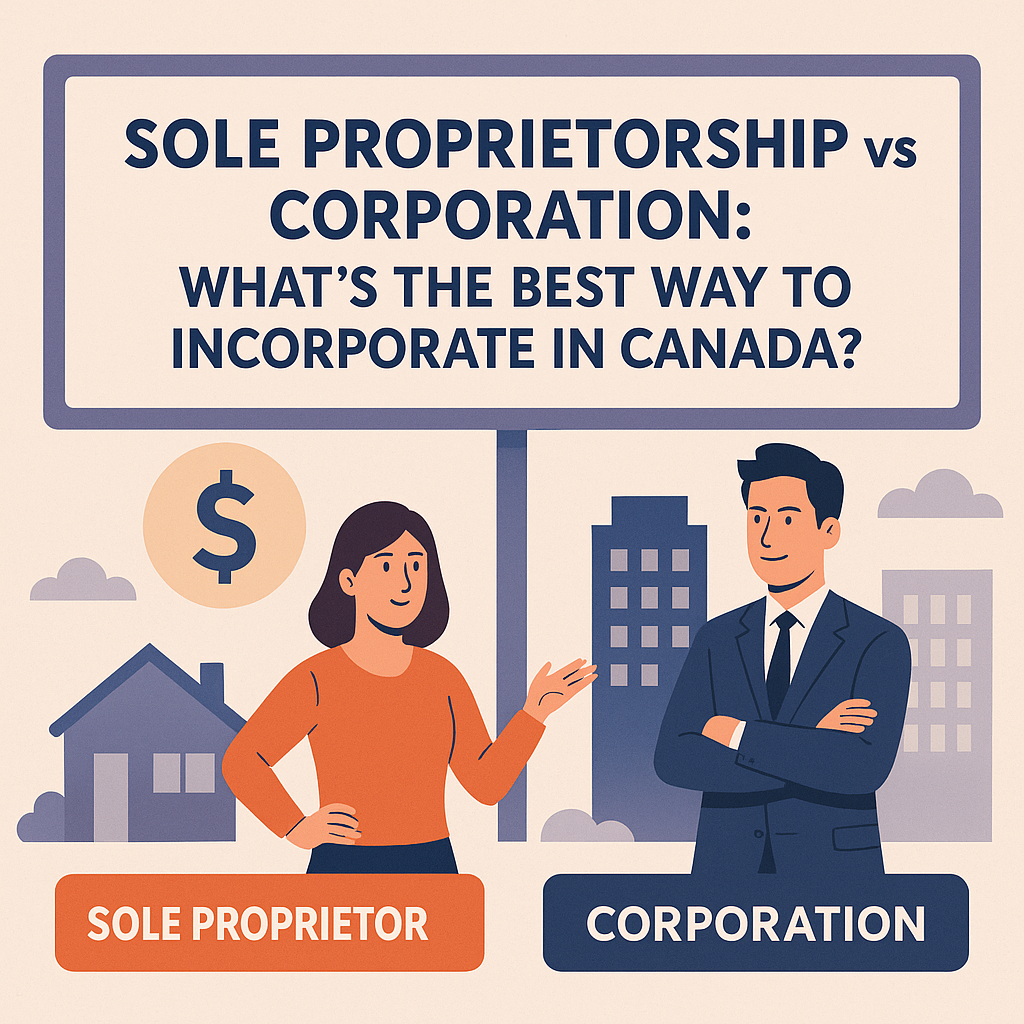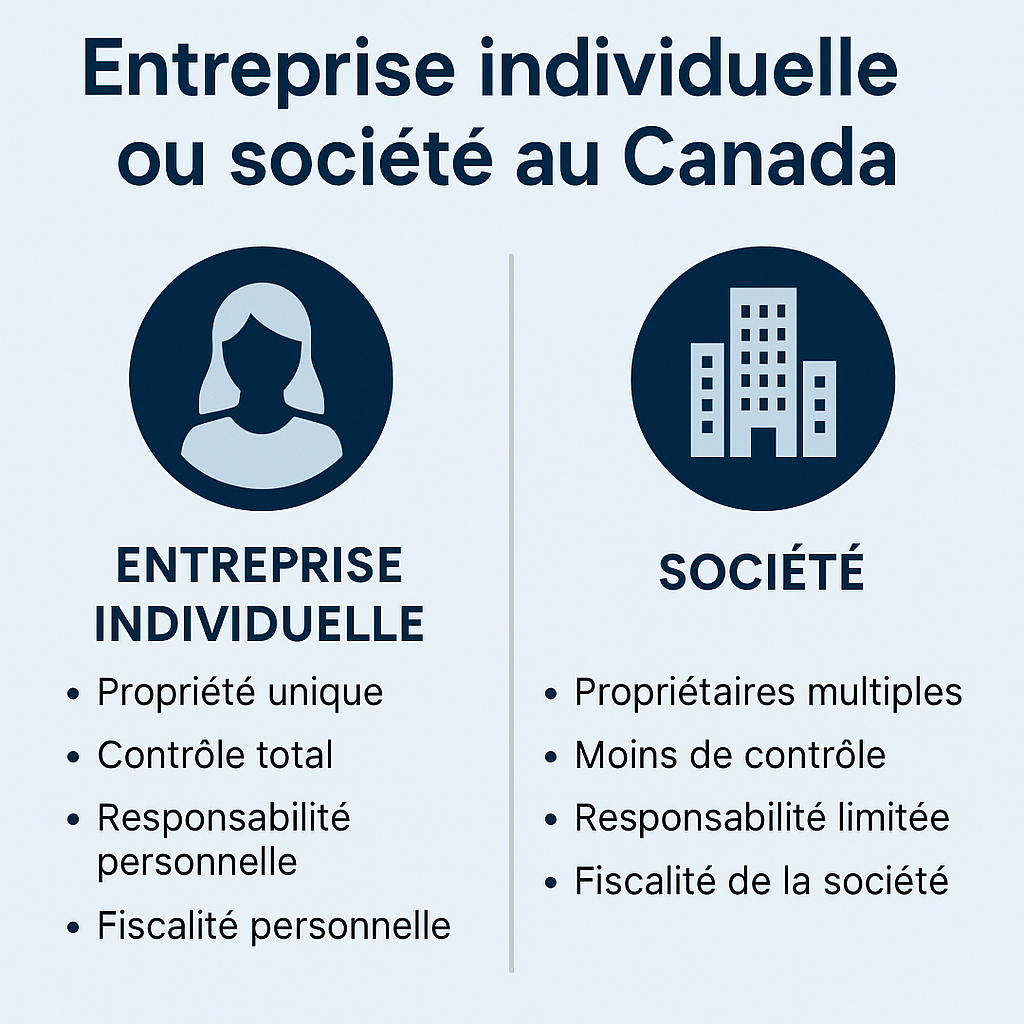Sole Proprietorship or Corporation: What’s Best for Canada?
Understanding the different types of business ownership is important for any new business owner in Canada. The most common setups are sole proprietorships and corporations, and each comes with different rules, costs, and risks. This article explains what each option means and which one might work better for your situation.
Business Ownership
Picking a business type starts with learning about ownership options. In Canada, people starting a business often choose from three main types: sole proprietorships, partnerships, or corporations. Each has its own rules, taxes, and level of flexibility.
Sole proprietorships are the simplest form of business. One person owns and runs everything. Partnerships involve two or more people sharing the work and profits. Corporations are more structured and treated like a separate person in the eyes of the law.
Understanding these types helps you match the right model to your goals, industry, and level of risk.
Difference Between Incorporation and Sole Proprietorship
The main difference between these two options is about liability and ownership. A sole proprietorship is run by one person, and that person is responsible for everything the business does.
A corporation is treated like its own person under the law. It can borrow money, own things, and get sued without putting the owner's personal stuff at risk. This means your home, savings, or car are usually safe if the business gets into trouble.
Incorporation also separates personal and business finances. This makes it easier to track profits and file taxes.
Difference Between Proprietorship and Corporation
A proprietorship is simple and cheap to start. You don’t need to file many documents, and all income goes on your personal tax return. This makes it a good option for people who want to try out a business idea quickly.
A corporation gives you more protection, some tax planning tools, and often looks more professional to others. You may need a lawyer or accountant to help you set it up and stay compliant.
Corporations also allow you to pay yourself a salary or dividends, which can lower your total taxes over time.
Difference Between Sole Proprietorship and Corporation
Here are the main ways they’re different:
- Taxes: Sole proprietors pay taxes on business income as part of their personal taxes. Corporations file their own tax forms and might pay lower rates. This can save money if your business makes a lot of profit.
- Risk: Sole proprietors are personally on the hook for all debts. A corporation limits that risk.
- Business Life: A sole proprietorship ends when the owner quits or passes away. A corporation keeps going and can be sold or passed on.
- Money: Corporations can raise money more easily by offering shares or bringing in investors.
Incorporation Versus Sole Proprietorship
Which one you choose depends on what you want:
- Incorporation works well if you plan to grow, want to limit personal risk, or hope to raise money.
- Sole proprietorship is good for small, local work or testing a business idea.
Incorporation might also help you access government funding or business credit lines more easily.
Proprietorship vs Incorporation
Here’s a simple comparison:
What to CompareSole ProprietorshipCorporationCost to StartLowMedium to HighPaperworkEasyMore StepsRiskAll on youShared with businessTax OptionsFewMore ChoicesImageInformalMore Professional
Corporations often require yearly reports and meetings. Sole proprietors don’t have those duties, which saves time.
Proprietorship vs Partnership
Partnerships are also simple to set up. But unlike sole proprietorships, two or more people own and run the business together.
Comparison:
- Sole Proprietorship: One owner, full control.
- Partnership: Shared control, shared profits and losses. It’s smart to have a written agreement.
Partnerships can be general (equal control) or limited (some owners just invest money). Choose what fits your team.
Sole Proprietor vs Corporation
If you’re running a business on your own and thinking about switching to a corporation, keep in mind:
- Room to Grow: Corporations are better if you want to expand.
- Tax Planning: There are more tools available to manage taxes.
- Reputation: A corporation may look more serious to customers and investors.
- Hiring Staff: Corporations make it easier to bring on employees and set up payroll.
Sole Proprietor vs Incorporation
Is it worth it? Even though starting a corporation costs more and takes more time, it can be worth it if you plan to grow or want to protect your personal assets.
Also, corporations can stay open even if you step away from the business. This gives long-term value and may help in planning for retirement or selling the business later.
Sole Proprietorship and Corporation
Both types are common in Canada. Some people start small with a sole proprietorship, then switch to a corporation later. Others begin with a corporation for the added protection.
There’s no “one-size-fits-all” answer. It depends on your industry, how much money you plan to make, and your comfort level with paperwork and rules.
Sole Proprietorship vs Corporation
What to Look AtSole ProprietorshipCorporationSeparate Business?NoYesTax FilingPart of personal returnSeparate tax returnBusiness LifeEnds if owner leavesKeeps goingPersonal RiskHighLowerSetup ProcessSimpleMore complex and costly
Also consider branding: corporations can register a business name Canada-wide. Sole proprietorship names are usually limited to one province.
Sole Proprietorship vs Incorporation
Think about incorporation if you:
- Want to keep your personal assets safe
- Need to raise money or find investors
- Are building a business for the long term
- Want to appear more professional or secure contracts with bigger companies
But if you're just starting or want something simple, a sole proprietorship might be the best place to begin. You can always switch later as your business grows.
Which Incorporation Is Best in Canada
In Canada, you can choose to incorporate at the federal or provincial level:
- Federal: Your business name is protected across Canada. It has more rules but looks more official.
- Provincial: It’s cheaper and faster to set up but only works in one province.
Pick the one that fits your business. National or online companies might go federal. Local businesses often choose provincial.
Each province has its own setup process and fees. Make sure you check local rules before starting.
How Plania Can Help with Your Business Plan
Once you've chosen your business structure, the next step is building a strong business plan. This is where Plania comes in. Plania is an AI-powered tool that helps entrepreneurs create professional, investor-ready business plans in less than an hour.
Whether you're forming a sole proprietorship or a corporation, Plania walks you through each section — from your executive summary to your financial projections. It saves you time, reduces costs, and helps you stay focused on your business goals.
Whatever your choice, knowing your options helps you build your business on the right foundation. Plania makes it easy to create a full business plan that fits your setup, goals, and growth plans. Start smart, grow strong.




